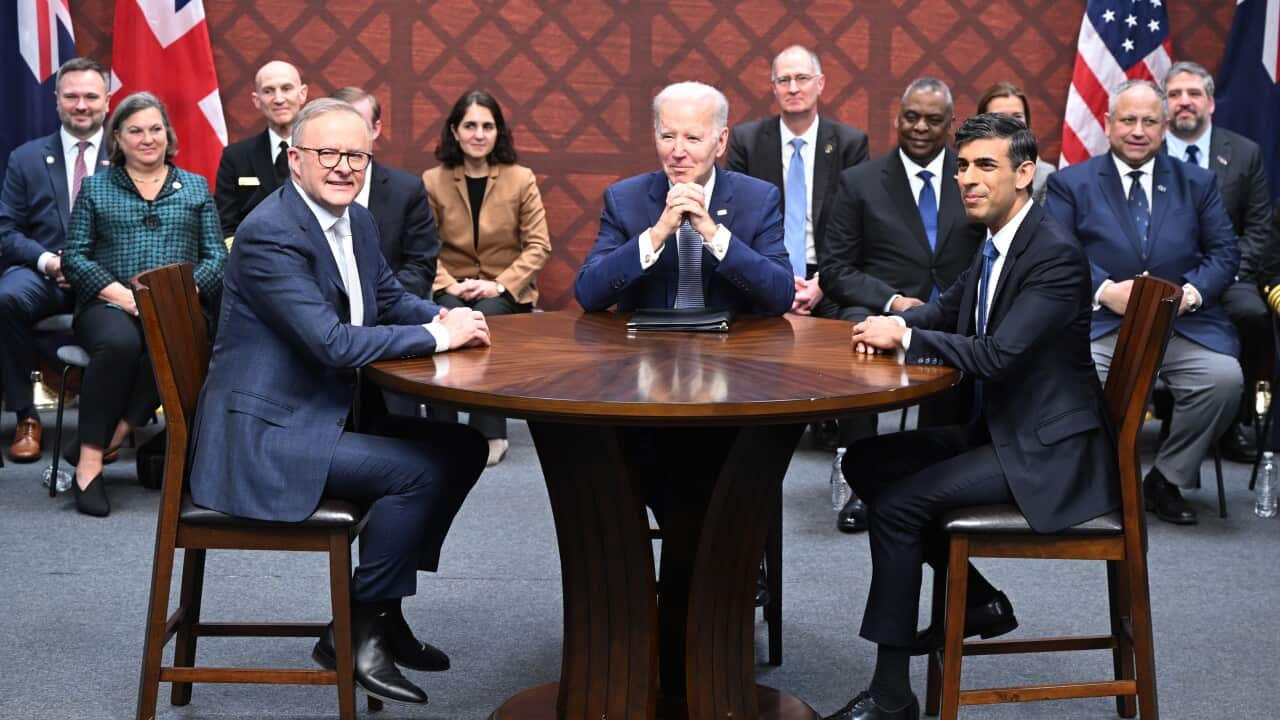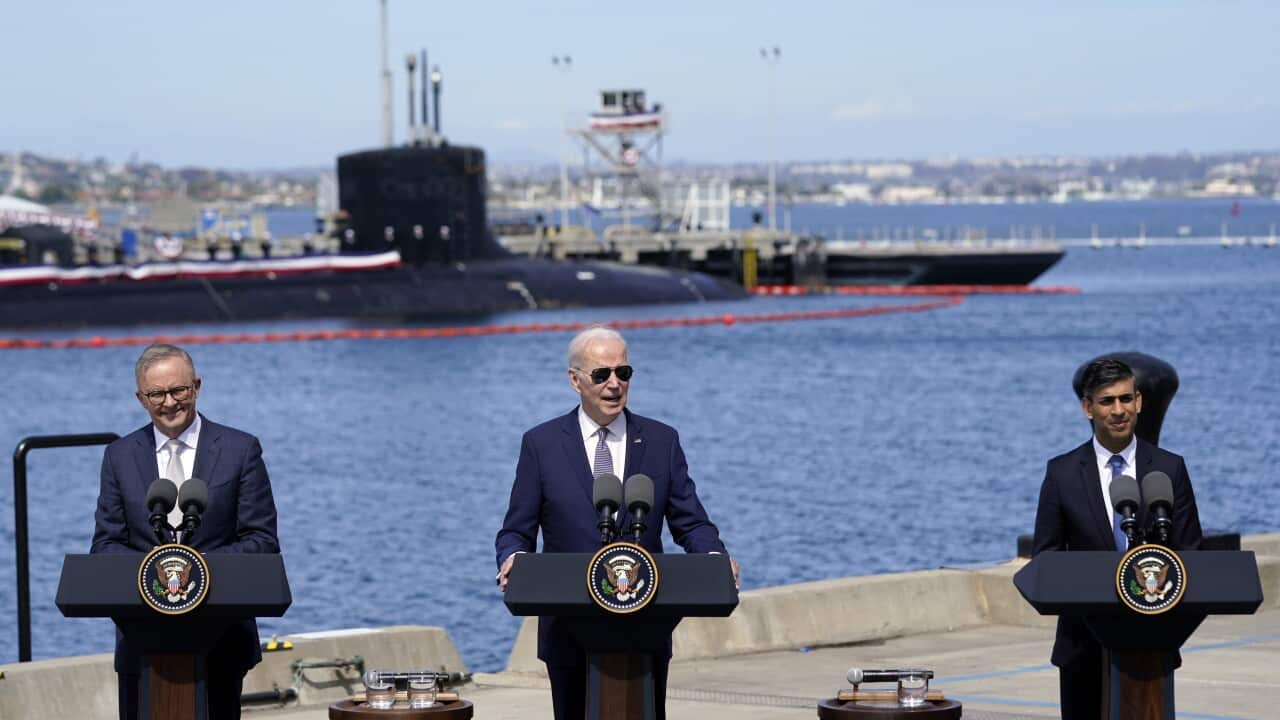Prime Minister Anthony Albanese seemed to be trying to inject some calm after Monday's joint AUKUS announcement that Japan would be considered as a partner for the alliance rattled China.
"What is proposed is to look at 'pillar two' of AUKUS and look at a project-by-project basis, whether there would be engagement, and Japan is a natural candidate for that to occur," Albanese said at a press conference in Canberra on Tuesday.
"What is not proposed is to expand the membership of AUKUS."
READ MORE

What do we know about AUKUS?
However, experts point out that even with Albanese's downplaying of Japan's potential involvement, the plans are clear.
Emma Shortis, a senior researcher in international and security affairs at the Australia Institute, told SBS News that there is "a deliberate effort" by the political sphere to minimise the connection between pillar one and pillar two of the AUKUS agreement.
"There's this effort to distinguish between them as almost completely unique agreements, and I think that's a bit disingenuous," she said.
"A country joining pillar two in partnership or on a project-by-project basis … is explicit support for Australia acquiring nuclear-powered submarines and a certain kind of strategic outlook on the region."

(left to right) Prime Minister Anthony Albanese, US President Joe Biden and UK Prime Minister Rishi Sunak of the UK at the announcement of the AUKUS nuclear submarine deal Naval Base Point Loma in San Diego, California in March 2023. Source: Getty / Anadolu
What is AUKUS?
AUKUS, the trilateral agreement between the United States, United Kingdom and Australia forged in 2021, is aimed in part at limiting China's growing influence in the Pacific and beyond.
The first phase is centred around supplying Australia with nuclear-powered submarines with a price tag of up to $368 billion over a decade.
The second phase, which Japan is being considered for, is focused on advanced capabilities and military technologies which include quantum computing, hypersonic, artificial intelligence, undersea and cyber technology.
Speaking at the US Navy League's Sea-Air-Space conference in Washington this week, Australia's Minister for Defence Industry Pat Conroy highlighted that the three members of AUKUS are already working on second phase technology together.
The UK's Second Sea Lord, vice admiral Martin Connell, told the conference that seabed technology for AUKUS "went from concept to a trial on Australian and UK ships within six months" proving that work between the three countries is well underway.
A summit in Washington on Wednesday between US President Joe Biden and Japanese Prime Minister Fumio Kishida is expected to expand on what Japan's future involvement in the AUKUS agreement could look like.
What's been China's response?
In a press conference on Monday, Chinese foreign ministry spokesperson Mao Ning responded to a question from the Reuters news agency regarding reports that Japan was being considered as a partner in the AUKUS agreement, a development that China was "gravely concerned" about.
"The US, the UK and Australia have kept sending signals of AUKUS expansion, co-opting some countries to come on broad, and escalating an arms race in the Asia-Pacific to the detriment of peace and stability in the region," Mao said.
Mao said China opposes "exclusive groupings" that stoke "bloc confrontation", warning Japan that it needs to "draw lessons from history and stay prudent on military and security issues".

An artist's impression of what the AUKUS-class submarine will look like. Credit: Supplied by Defence.
"I think it's the kind of language we've learned to expect from China regarding these announcements," she said. "It would be hard to characterise AUKUS as anything but an effort to counter and contain China because that is what it is."
Shortis said the bigger problem with the agreement itself is that it's causing "unnecessary" instability between China and Australia.
"I think the potential for it to generate or accelerate an arms race is very real … this kind of forward defence policy that AUKUS represents increases that risk."
What could be at risk?
Upsetting China by including Japan in the AUKUS agreement could put Australia's most important trade relationship in an awkward place.
China accounted for 26 per cent of Australia's goods and services trade with the world in the 2022-2023 fiscal year.
Two-way trade with China increased 12 per cent in that period, totalling $316.9 billion, according to the Department of Foreign Affairs and Trade.
With Australia celebrating a thawing in the trade relationship between the two countries just two weeks ago, as China lifted the wine tariffs it imposed in 2020 as part of the diplomatic feud over Australia's support for a global inquiry into the origins of COVID-19, the latest AUKUS developments seemed to be a step back.

Members of the Sydney Anti-AUKUS Coalition (SAAC) at a protest in Sydney in 2021. Source: Getty / Anadolu
"I think involving Japan in AUKUS will certainly concern Beijing … [but] China has for years been strongly opposed to AUKUS and views it with a great deal of suspicion," he told SBS News.
"However China was willing to re-engage with Australia and repair the relationship in full knowledge that AUKUS would remain a fixture of Australia’s external policy."
Herscovitch also highlighted that with China being "one of the most effective intelligence gathering countries in the world" it’s unlikely this announcement was a shock or surprise.
But closer to home, not everyone will be happy with the developments, according to Shortis.
"In the national security establishment in Australia, there will be some disquiet about Japan joining," she said. "It upsets the sense of Australia being special and particularly being special when it comes to the United States."
What could be the fallout?
While the involvement of Japan is a "wrinkle" in Australia-China relations, Beijing will likely direct its frustration with the development at Japan and the US, not Australia, according to Herscovitch.
"I think China wouldn't want to overreact to this right now," he said, adding that "one very plausible option" for China to show its displeasure with Japan would be to instigate government-supported boycotts of Japanese products – something they have done in the past.
It's most likely that China would step up its diplomatic campaign aimed at discrediting AUKUS and Japan, he said.
LISTEN TO

Reaction to Australia's 4.6 billion dollar deal with UK industry to help deliver on AUKUS submarines
SBS News
22/03/202401:16
"From an Australia-China point of view, we are heading towards a removal of the final two trade impediments on lobster and beef in the next few months," Herscovitch said.
"We're gearing up towards China's premier visiting Australia likely in the middle of this year."
"Beijing will be willing to bear its frustration with these little developments with the goal of repairing the Australian relationship."
Shortis believes the government will have to continue walking a "delicate" line in both language and action surrounding AUKUS to avoid further upset, but said more will be revealed after Wednesday's summit in Washington between the US and Japan.










